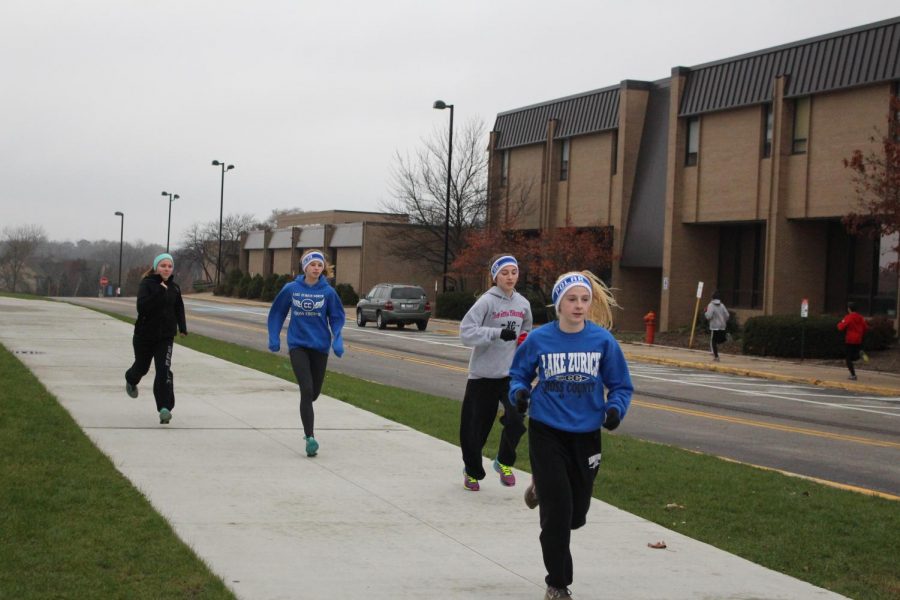The Polar Bears of Lake Zurich
dedicated athletes who run in the below freezing temperatures throughout the winter
Photo by Photo by Valerie Multra
Hayley Burk, freshman, Emily Burns and Jillian Baffa, juniors, running after school for Polar Bears. Members of Polar Bears meet daily after school to train in the offseason.
Through snow, ice, and freezing temperatures, one group of students run outside in an average temperature of 17°F while other sports practice inside the school during the winter.
Members of the boys and girls cross country team do not stop running despite the dramatic changes in weather even after the season is over. Between the end of the cross country season (November) and the start of track (January), a group of runners called Polar Bears meet daily after school to stay in shape for the offseason, even if that means running through extreme weather conditions.
“I always think it’s funny to watch when people leave the building compared to when they come back [and] the change they went through over the course of one run. Whether it be their faces are frozen, their fingers are frozen, [or] their hair is frozen, they come back and they are still smiling and still happy they went out and ran,” Drake Heisterkamp, senior cross country and track runner, said. “They have no regret on their face at all– even after they are freezing.”
Battling this weather takes dedication, however, and Heisterkamp agrees that the team’s motivation for training in the offseason stems from the support from their own team as well as personal ambition.
“We’re always trying to push each other, help each other, and make each other stronger and faster. We suffer together in the cold, in the snow, [and] through hail, ice, and falling over,” Heisterkamp said. “But, we definitely help each other, push each other, and make sure we’re staying on top of our mileage so none of us get lazy. [We’re] making sure everyone shows up on time and gets to practice daily, making sure people still train like they would in season.”
It’s about a choice not a requirement, according to Heisterkamp, and no one is forcing these polar bears to do anything. Mark Santi, sophomore cross country and track runner, agrees that members choose to run outside in the cold together, and choose to suffer together.
“I [choose] to go out and run in the winter because a lot of the guys do it, and when you see everyone else you just decide to join them because it’s something you and all your teammates are working together on to go do.” Santi said. “The best part is probably the challenge: you’re running a lot and going out in the cold weather doing something that you normally wouldn’t do.”
The challenges that come with Polar Bears not only include the harsh weather and getting to practice, according to Heisterkamp and Santi, but making yourself go and then getting through the freezing run.
“The most challenging part is actually showing up to practice [when] you have no obligation to go [and] no obligation to get better,” Heisterkamp said. “No one is making you get any better at this sport. It’s all about what you want.”
Without a coach, newer members lack motivation even more and it’s hard for them to go to practice, according to Heisterkamp. Although it is not a requirement, newcomers do not realize that without training in the offseason they will lose training, and they will lose everything they have built up. According to Jillian Baffa, junior cross country and track runner, you can not slack off if you want to reach your goals.
“My motivation is thinking about all the times I want to achieve and [seeing other] really talented runners who [are] super crazy fast,” Baffa said. “My goal is to one day go to state with my team, so staying in shape in the offseason really helps that.”
Especially when it gets into the negative degrees, the weather becomes a challenge because Polar Bears then sometimes have to bike upstairs or run inside lap, according to Baffa. This comes with the difficulty of schedule conflicts with other clubs that could cause people to not be able to run. Due to this, Baffa says working around the other activities is necessary since Polar Bears isn’t an official sport in season.
“We have this team quote…and it goes: When it’s too hot, cold, snowy, rainy, miserable, or humid, it’s just right for us. We do things that other people can’t and won’t do,” Heisterkamp said. It’s just something we get to do together as a team, and I think there’s a fun aspect in it. Even when we’re miserable and dying, we find fun out of it.”

Valerie is a sophomore and Sports Editor of Bear Facts Student Media. She is involved in cross country, track and field, theater, sophomore class board,...

